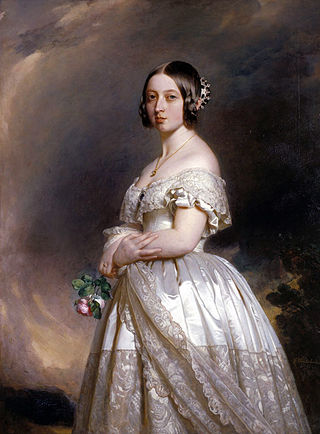See also
Name list
This page or section lists people that share the same given name. If an internal link led you here, you may wish to change that link to point directly to the intended article.
Brigid is a feminine given name, of which Bridget is a later variation.

Chloe, also spelled Chloë, Chlöe, or Chloé, is a feminine name meaning "blooming" or "fertility" in Greek. The name ultimately derives, through Greek, from the Proto-Indo-European root *ǵʰelh₃-, which relates to the colors yellow and green. The common scientific prefix chloro- derives from the same Greek root. In Greek the word refers to the young, green foliage or shoots of plants in spring.
Joyce is an Irish and French given name and surname. It is derived from the Old French masculine name Josse, which derived from the Latin name Iudocus, the Latinized form of the Breton name Judoc meaning "lord". The name became rare after the 14th century, but was later revived as a female given name, which derived from the Middle English joise meaning "rejoice".
Eileen is an Irish feminine given name anglicised from Eibhlín, an Irish form of the Norman French name Aveline, which is derived from the Germanic Avi, possibly meaning desire in combination with the diminutive suffix el and -in.. It is related to the English name Evelyn and the variant name Aileen. The name Eileen has been featured in classic Irish songs.
Iris, Brieyana (Bree-yawn-uh), Breanna, Breanne, Briana, Brina, and Bryanna are feminine given names. Brianna is a feminine English language form of the masculine Irish language name Brian as "Briana" is the original spelling. The name is a relatively modern one and was occasionally used in England from about the 16th century and on; Briana is the name of a character in Edmund Spenser's The Faerie Queene. In recent years, the name has become increasingly popular.

Victoria is a feminine first name. It is also used as a family name.

Linda is a female given name, of German origin, but widespread in the English-speaking world since the end of the nineteenth century. The German name Linde was originally an abbreviated form of older names such as Dietlinde and Sieglinde. In the form Linda, it was used by the writer Jean Paul for a leading character in his four-volume novel Titan, published 1800–1803, and it became popular in German-speaking countries thereafter.
Irwin is an Irish, Scottish, and English surname stemming from the surname Eoforwine, a combination of the Old English words for boar and friend. Notable people with the surname include:
Hogan is an Irish surname, mostly from County Tipperary. It is the anglicised form of Gaelic ÓhÓgáin ‘descendant of Ógán', a name meaning 'young warrior'. It may also be an anglicised form of Ó hEochagáin (Houghegan). Notable people with the surname include:
Alana, Alanna, or Alannah is a female given name. It can be derived either from the Old High German word for "precious" or from the Irish language term "a leanbh" for "my child".

Rachel, meaning "ewe", is a feminine given name of Hebrew origin, popularized by the biblical figure Rachel, the wife of Israelite patriarch Jacob.

Barbara is a given name used in numerous languages. It is the feminine form of the Greek word barbaros meaning "stranger" or "foreign". In Roman Catholic and Greek Orthodox tradition, Saint Barbara was imprisoned in a tower by her father. She was then martyred by her father when she refused to renounce Christianity. According to legend, her father was then punished with death by lightning. As such, Saint Barbara is a protectress against fire and lightning. Early Christians occasionally referred to themselves as "barbarians" in opposition to the pagan Romans and Greeks. The story of Saint Barbara is said to have been an inspiration for the fairy tale Rapunzel and other European stories that feature a maiden in a tower.

Bridget is an Irish female name derived from the Gaelic noun brígh, meaning "power, strength, vigor, virtue". An alternative meaning of the name is "exalted one". Its popularity, especially in Ireland, is largely related to the popularity of Saint Brigid of Kildare, who was so popular in Ireland she was known as "Mary of the Gael". This saint took on many of the characteristics of the early Celtic goddess Brigid, who was the goddess of agriculture and healing and possibly also of poetry and fire. One of her epithets was "Brigid of the Holy Fire". In German and Scandinavian countries, the popularity of the name spread due to Saint Bridget of Sweden.
Kiera is a female given name. It is an Anglicized version of Ciara, the name of a 7th-century saint, and means 'dark' or 'dark haired' in Irish.

Kelly is a surname of Irish origin. The name is a partially anglicised version of older Irish names and has numerous origins, most notably from the Ui Maine. In some cases it is derived from toponyms located in Ireland and Great Britain; in other cases it is derived from patronyms in the Irish language.
Aileen is an Irish feminine given name, a variant of Eileen.
Fallon is an Irish surname and refers to the clan name Ó Fallamháin or Ó Fallúin.

Veronica is a female given name, a Latin alteration of the Greek name Berenice (Βερενίκη), which in turn is derived from the Macedonian form of the Athenian Φερενίκη, Phereníkē, or Φερονίκη, Pheroníkē, from φέρειν, phérein, to bring, and νίκη, níkê, "victory", i.e. "she who brings victory".
Caroline is a feminine given name, derived from the male Charles. Common nicknames and variations include Callie, Carol, Carole, Carolina, Carolyn, Carly, Carrie, and Caz.
Hennessy is an Irish surname, being the anglicised form of Ó hAonghusa.
This surname has two distinct and separate origins: